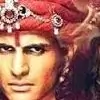Jodha Akbar 5: Bipolar bitterness
Folks,
I was glad to notice two things on our thread. One, which delighted me, was the lively discussion on JA-related and non-related topics by many of you, including resurrected dropouts like my Chipmunk No.1, Alakh. Pretty soon she will find some fellow-conspirators and will turn this thread into a such a tangle of wisecracks and nutty posts that I shall be hard put to locate the comments that I need to respond to. Already,with daily posts on the same thread, I am getting confused as to which I have replied to and which I am yet to do so. And there asre some, like yours to the Episode 2 post, Preeti, which just get lost. When Alakh gets going, I do not know what I am going to do!😉
Two, that no one here has, thanks to this lively discussion, noticed that I did not post last evening on this episode, as I should have. I had guests who came for the whole afternoon, and I could not sit down at the laptop at all. So I am a day late, which is as well, for you needed a break from me, to chat among yourselves. I found these exchanges fascinating.
Ok, now to business. This episode is drenched in bitterness - in both Jalal and Jodha - whence the title. But the nature of the bitterness is different for each. Let us see why.
Jalal: Personal alienation: See, we have ended up beginning with the best part of the episode, the scene between Jalal and his mother Hamida Bano! It was a superlative segment, that reinforced the maxim that less can be more and small is beautiful. I have watched it 6 times this time around, and still, the expression in Jalal's eyes at every point of the exchange simply blew me away.
The scene opens with a characteristic snippet of Sharifuddin trying some chaploosi on the Shahenshah, for having tamed that wild horse: Ise kehte hain sarphire ka sar jhukana! Jalal, who has just reined in the bolting , rearing horse, and leapt on to its bare back (Rajat does this very well indeed) , does not vouchsafe his subedar even a nod, but sits ramrod straight on the horse, eyes looking straight ahead.
Then he rides over to his Walida, to whom he offers a traditional salutation, continuing with Aap yahan? (seems to be his standard opening line, whether to Jodha's rooh or to his mother!😉). He does not however look at her, or meet her eyes. As she launches into a placatory, would-be familiar approach, with a question as to when he would return to Agra, he responds with cold off-handedness that he would have replied if she had written a letter to him, as his Badiammi had done. His eyes are as remote and detached as his words.
Which is where Hamida Bano makes her first mistake in this exchange, when she says: Khat, wo to siyaasati rasam lagti hai. Aur siyaasat ke liye jazbaton ki nazarandaz nahin kar sakte Jalal!
Jalal pounces on this opening that falls into his lap, metaphorically speaking. He swivels around, and his eyes finally look into hers as his words, delivered without overt anger and in a level tone that belies the surging rage within him, drip vitriol. Shayad wo to humein virasat mein mila hai..The lips are twisted into a smile that is anything but pleasant...Aapne bhi to siyaasat ke liye jazbat ko chhod diya tha na? Her Jalal!, drips anguish but what is the use? Like an unwary chess player, she has brought this on herself.
Jalal now ups the ante, and what follows is deliberately honed to hurt his mother as much as he can. That he is hurting himself in the same process - as Hamida says, Jalal apne zakhm ko khured khured kar naasoor bana raha hai - is something he either does not realise or does not care about.
After explaining why he cannot return to Agra now because of the war with Amer that lies ahead, he turns his back to her, pointedly and insultingly, as he says, and each word, like a well aimed lance, hits home unerringly: Jab aap wapas jayengi, to Badiammi se kah dijiye ki hum unhein har dum yaad karte hain...Aur humari begum Ruqaiya se keh den ki hum unhein din mein kam se kam do baar to zaroor yaad karte hain..
Hamida Bano's face - and she looks much younger here than she does later in Agra (and Rashmi, I am afraid there is not Dabur Keshkala angle to her, for the line you see running into her hair is not white hair but a parting!) - looks as desolate and tragic as that of a hurt child. She again leads with her chin as she asks precisely the one question she should not have asked: Hum yaad nahin aate tumhein?
That does it. The inner wall in Jalal's zehen that holds back his bitterness to some extent breaks, and he lashes out in sarcasm so cold and biting that it must have chilled Hamida Bano to the bone. He looks into her eyes once again, his own full of icy contempt as he searches for words that can be as hurtful as possible.
Yaad karte hain. Jab bhi hum kisi laawaris ko pattharon ke beech rote dekhte hain, to aap yaad aate hain -each of the last words stressed for greater effect - Shayad us maa ki bhi koyi majboori rahi hogi!
As Hamida recoils from this blast, Jalal turns on his heel and, with a curt Khuda hafiz, he leaves. As he walks away, the taaveez from Ajmer Sharif that she has tied on his arm falls to the ground; it is not clear if that was inadvertent or deliberate on Jalal's part, but the net result is the same.
What lies ahead, alas!:Hamida is left lamenting: Bas ab ek hi ummeed hai, ki koyi aaye uski zindagi mein, roshni bankar, jo use in andheron se nikal sake. With that pronouncement, we are forewarned as to what to expect: a Jodha Mahaan-who-can-do-no-wrong, who will exorcise the darkness in Jalal's soul, unearth his dil that was hidden in some corner of his being, give it enough to cardio-pulmonary ressucitation to get it going😉, and generally spread sweetness and light all around, and end up with an XXL 24 carat halo around her pretty head. 😡
The roots of alienation run deep: Alakh felt that Jalal was too rude to his mother here, especially as their separation was not her fault. But that begs the nature of child psychology. The scene only shows the depth of Jalal's bitterness of well over a decade at what he sees as his having been abandoned by his mother, and left to the care of Maham Anga and Bairam Khan. That she had no choice is not an argument that a child will accept. And a grievance that is so deep-rooted in childhood takes a long time to be erased, and sometimes it can never be erased .
Remember Amitabh's younger version in Shakti? What he infers from the telephone call his police officer father makes is mistaken, but what is relevant is that the child understands it as his father's readiness, for the sake of his official duty, to leave his son to his fate with the kidnappers. Now some children might be proud of a father so dedicated to his usool , but not this one. The grudge is never erased, and his relationship with his father is soured for life.
Also, just as Dilip Kumar's character in Shakti never tries to explain to his son exactly what he was trying to do, similarly here too, Hamida Banu does not seem to be explaining too Jalal just how hard it was for her to give up her son even temporarily, and how she was literally forced to do it for Jalal's own sake, to ensure his safety and survival even if his parents were to perish.
So I do not think the scene was OTT. It was a scintillating display of acting by Rajat - the bitterness in his clear eyes , and in his level voice that is never raised in overt anger, leaps out at you and sears the screen. I was quite blown away, and I am no fan of his, or of any other actor. In fact it was this scene, and the one with Abdul in Episode 4, that made me decide to stay on!
Jodha: Anger for public concerns: Jodha too is bitterly angry towards Jalal, but her anger, triggered by the desecration of a public place of worship by the Mughal soldiers, is not personal as his is. Her virulent denunciation of Jalal, very largely based on hearsay like much else about him, bears this out: Insaan ko insaan hi nahin samajhta hai.. Bhagwan ke mandir tak to nahin chhodta...Jo bhi uske raaste mein aate hai, unhein kuchalna hi jaanta hai..
Moti's counter argument is amazing in its logic and breadth of vision, unexpected from someone at her level who has, moreover, suffered at the hands of Jalal's soldiery: Zaroori to nahin ki log jo kehte hain wo sach ho? Kya pata uske sainik uska naam lekar galat kam karte hon aur Jalal ko malum hi na ho?
But for Jodha, Jalal the Jallad is an idee fixe, and she has no notion go letting logic or rationality get in its way. So she retorts: Andha, behara to nahin hai wo! Jo hota hai usi ke hukum se hota hai!.. Humne Bhai sahib se bhi suna hai ki wo kitna nirdayee hai.. Humne to yahan tak suna hai ki wo apni maa tak ko nahin poochta hai!!.. Insaan nahin, patthar hai wo, patthar! Uske seene mein dil hi nahin hai! (How can a patthar have a dil? But never mind, for logic was never Jodha' strong point!)
But I must say that Jodha looks very beautiful in this sequence, and the anger in her face and eyes is fiery but controlled.
Her subsequent stated determination - apart of course from wanting Jalal's mrityu to be facilitated by Devi Maa, followed by Jalal ka sar at the Devi Maa's feet - is to have a page for herself in the chapter in history that she concedes, undoubtedly with great reluctance, will be devoted to Jalal: wo panna jo Jalal ki zindagi to badal ke rakh de..
It is not clear at this point whether this badalaao is to effected by having Jalal's sar detached and put at the Devi Maa's feet, or by transforming him😉, but the general tenor of Jodha's bitter comments leaves no room for doubt.
Maa Saraswati has indeed spoken thru her at this moment. What she has, in her usual Delphic fashion, left unsaid is that the one who can, and would, put Jalal's head at the feet of the goddess was Jalal himself. But that exquisite scene is 82 episodes away, so we have to possess our collective souls in patience till we get there.
Motibai excels: Moti's response to all this is amazingly lucid and concerned. She warns Jodha, in words that are as measured and rational as one could wish: Itihaas bhi kismet hi tarah hota hai, Kunwari Sa.. Kiska naam kiske saath, kahan, kis mod par judta hai, koyi nahin jaanta...Pata nahin aapka naam kiske saath likha jayaega...
Moti, why, oh why did they replace you? There is no one whose exit I have missed more, except for Abdul. You had the wisdom, the logical mind and the detached affection and loyalty that could have held a mirror up to your mistress' face, and moderated Jodha's excesses of mahaanta and preachiness. You were a real character, not a wooden bystander with a flat, expressionless voice. But as with Abdul, our luck did not hold.
Death to Jalal!: Earlier, Moti comments, half seriously and half in humour, that if Jodha devoted half the time she spent thinking about and hating Jalal to thinking about the man she would love, her prem kahani would be up and running by now. Apart from the fact that Jodha is thinking about the man she will come to love, there is a curious parallel in the Ramayana to Jodha's hatred for Jalal
After Lord Rama has defeated Raavana on the battlefield, there is an amrit varsha which, strangely enough, , resurrects only the dead vaanar, not the dead Rakshasas. When Sugriva asks Hanuman why this is so, he is told that since all the Rakshasa soldiers, who went into battle shouting Death to Rama!, had died with the Lord's name on their lips, their souls had gone straight to Heaven. But the vaanar soldiers has been shouting Death to Raavana!, and so they had not reached instant salvation, but had been restored to their earthly existence!
Similarly, Jodha, with her Jalal ka sar, or Death to Jalal!, ka naara, is headed straight to falling in love with him, which is her kind of salvation!
Siyasaat, and love, entangled: I am not going into the portly Bharmal's convoluted attempts to inveigle the other Rajas into a solid front with Amer against the Mughals:ek pagdi, ek watan, ek dushman. There is hardly any enthusiastic response from those trailing after him, and while one asks, maliciously, about rumours that Bharmal had himself sought help from the Mughals, which Bharmal stoutly denies, another declares that he does not want any dushmani with Jalal. So much for the ek mutti!
Nor am I going into the Sukanya- Suryabhan-Jodha triangle, triggered by the fact that all the three sisters are wearing identical, and extremely fake-looking necklaces. (Oh for the real Tanishq jewellery in the film!). There is nothing to analyse there, and Suryabhan's face seems incapable of any varying expressions. He apparently reserves all his mental energies for throwing bhaalas at the target.😉
Sabse bade soorma: So that brings us to the concluding, and extremely evocative scene between Jalal and his Khan Baba. When Bairam Khan states: Taariq mein tumhara naam sabse bade soorma ke taur par darj hoga, Jalal asks him why he is suddenly thinking along these lines. But his face shows smug self-satisfaction, for he knows that this rank is his, and that no one can question it.
What Bairam Khan goes on to say is curiously revealing, and this as much about himself as of Jalal. Achanak kahan? Barson se hum dekhta aarahe hain..Jeet ka junoon lekar paida hue ho tum. Dushman ho ya jazbaat, donon par bakhoobi qaboo paa sakte ho tum. Jung ka maidan ho ya ki mahal, jeet tumhare zehen par haavi hoti hai.. Raat ko sote waqt bhi apni shamsheer ko ek pal ke liye bhi apne se juda nahin karte..
A curious kind of love: What follows might seem to be a digression, but it is a vital one, so please bear with me as I set out my argument.
Bairam Khan cares deeply, not for Jalal per se, but for the young Shahehshah whom he has, so far, fashioned along his own creed: of victory by any means till his goal, the whole of Hindustan under Mughal rule, is achieved. Nothing, not jazbaat or any other distraction, must be allowed to get in the way. His protg, the most perfect fighting machine the world has ever seen, must not be distracted from his sole mission: to fight and to win.Whence his harping, in his mini-speech above, on jeet ka junoon.
It is in a way like Pygmalion, who fell in love with the statue he had made, Galatea. Here Bairam Khan is enchanted with Jalal, not only because he is such a failsafe winner in war, but also because Jalal is his creation. But he forgets that Jalal is a human being, and potentially a very powerful one, and human beings evolve and change with time, and not even the most obedient of pupils can be controlled for all time to come.
In self-destruct mode: When Jalal starts spreading his own wings, Bairam Khan no longer loves him. For this self-assertive Jalal is no longer the one who stands while his Khan Baba remains seated, and kicks out a loyal guardian of the Jodhpur fort because he had dared to complain to him, Jalal, that Bairam Khan had dismissed him without the proper imperial sanction (I am running a bit ahead here, and lower down too, but only to make this point). And this Bairam Khan cannot tolerate. This shows when overruled publicly by the Shahenshah, he loses his head and showers vituperative abuse on both Jalal and even on his father, the Emperor Humayun.
And so he destroys himself. Those whom the gods would destroy, they first make mad. Or as Sandhya has quoted: Vinaashakaale vipareeta buddhi..
I would not quite compare Bairam Khan's downfall to Raavana's, as Sandhya has done, for the latter was a giant of a man in most ways, whereas Bairam Khan had a narrow, tunnel vision that could look only at the expansion of the Mughal empire on the basis of fear and force. He never had the vision needed for the consolidation phase, or even the wisdom to understand that unless there was a consolidation phase, one part or the other of the empire he strove to build would be trying to break away in open rebellions that could never be put out completely, which would affect not just the political but also the economic health of the empire.
Bairam Khan started thinking of himself as the all knowing eminence grise, a Grey Eminence like Cardinal Richelieu to the French King Louis XIII. As he tells Salima, his loyalty was not to the Shahenshah but to the Mughal sultanat. He still considered Jalal a wayward young warrior who could win battles but not plan either tactics or strategy without being spoonfed by his Khan Baba. Whence his instructions to Jalal not to move on Amer till he said so (which Jalal circumvented by moving single-handedly on Amer!).
As for the other contender for "controlling" Jalal, Maham Anga, Bairam Khan never thought of her as a real rival till the very end, but only as a jumped up, upstart daayimaa. So he was not afraid of her. What infuriated him was that Jalal had countermanded him publicly and, at least in one instance, taken charge of the Takhatmal case himself. His raging to Salima later, about Jalal's ingratitude, shows that.
It is what the Greeks call hubris, overweening pride, that led to his downfall thru this case, and in that way, Raja Takhatmal had his revenge after all!
Taariq likhnewala kalam: But for now, we are far away from all this, and as Jalal declares that he cannot let go of his shamsheer even in his sleep, because Insaan ka muqaddar sote waqt bhi uska saath nahin chhodta hai, Khan Baba. To tum hum is shamsheer se juda kaise ho jayein?
And then with a visionary sweep of phrase: Aur yeh kalam hai jis se hum taariq likhenge.. Bairam Khan's response is as warm as could be, for this is yet his Jalal who speaks.
Bye for now, folks! I will be discussing the Saturday episode No. 6 tomorrow. Please do hit the Like button if you have survived this one in good shape!
Shyamala/Aunty/Akka/Di































